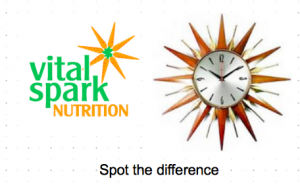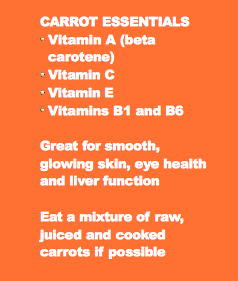Welcome to the inaugural blog here at Vital Spark.
I thought I’d start with carrots, seeing as my logo is a sunburst of the lovely golden roots. It reminds me of those fabulous clocks people had in the 1950s and 60s.
Speaking of the distant past, an early and fond memory I have is of my Grandad digging carrots from his garden on Shooter’s Hill in south London and handing them out – cleaned of course – to my brother and me.
Nowadays – I don’t know why – I find munching on a whole carrot a tad tedious. But the truth is that you will unlock much more of a carrot’s goodness anyway if you juice it or cook it.
And, if I grate, roast or juice them – or add them to a nice vegan cake – I find them much less onerous to consume. Be aware though, that cooking will destroy much of the vitamin C content so try to vary things and make sure you include raw, juiced and cooked carrots in your diet if possible.
Grandad always said carrots would help me see in the dark. Then again, he also told me that if I ate marmalade every day, I would one day be entitled to join the Queen’s Royal Regiment of Horse Guards.
But although carrots can support eye health – due to the large dose of vitamin A they contain – they can’t actually improve your eyesight, and therefore they can’t help you see better in the dark. That, according to various sources, was a myth put about by the British Government during World War Two to explain the RAF’s success in repelling German bombers. The truth was that they had developed an advanced new kind of radar that they didn’t want the Germans to find out about.
But beyond all the myths and propaganda there’s no doubt carrots are generally a very good thing. And cheap, too. As well as all that vitamin A in the form of beta carotene, they also contain vitamins C, B1, B6 and E. Great for skin, eyes… and the liver. Try to choose organic carrots whenever possible so your poor old liver isn’t having to deal with all those pesticide residues as well. Or – if you are lucky enough to have a garden – you could grow your own (carrots, that is, not livers). Carrots can also help prevent the eye problems we might encounter later in life, like macular degeneration and senile cataracts.
But it’s the sun-protective qualities of carrots that has me really excited. As a pale, freckly individual who has recently had some ‘dodgy’ sun damage removed, I’m interested in anything that could help my skin handle the sun’s rays better. (Thankfully the damage turned out to be benign.)
 It turns out that carrots – packed as they are with health-giving antioxidants – may help protect our skin against sun damage. This does not mean I advocate eating a carrot and then rushing out into the scorching midday sun without a hat, or indeed much other clothing on. But if you’re like me and pretty much burn if you sit next to a 100-watt light bulb then consuming carrots may be helpful when there aren’t any shady trees to hide under. I’ve tried upping my consumption through regular juicing, and I find I really don’t burn as quickly. Of course it’s also possible that living in Scotland has been a help. We don’t really understand the phrase ‘scorching midday sun’ here.
It turns out that carrots – packed as they are with health-giving antioxidants – may help protect our skin against sun damage. This does not mean I advocate eating a carrot and then rushing out into the scorching midday sun without a hat, or indeed much other clothing on. But if you’re like me and pretty much burn if you sit next to a 100-watt light bulb then consuming carrots may be helpful when there aren’t any shady trees to hide under. I’ve tried upping my consumption through regular juicing, and I find I really don’t burn as quickly. Of course it’s also possible that living in Scotland has been a help. We don’t really understand the phrase ‘scorching midday sun’ here.
If you go overboard with your carrot consumption you will end up glowing orange – actually not an unpopular look these days. So while overdosing on carrots is definitely not recommended, by all means include them regularly in your diet. One or two carrots a day would be great, along with the odd glass of delicious carrot juice, made with an apple and some fresh ginger. Just try not to get carried away.
And don’t bother with the marmalade.
Quickest carrot salad ever
Carotenoids (like beta carotene) are best absorbed with a little fat, so the olive oil in this recipe increases their ‘bioavailability’, which means it helps unlock more of their goodness.
Ingredients
2-3 tablespoons olive oil (depending on how much carrot you are dealing with: you want enough to coat the carrots but not drown them)
Generous teaspoon of black mustard seeds
One (or more) clean carrots, unpeeled if possible
Method
Coarsely grate the carrot
Heat the oil in a small pan until it’s hot
Add the mustard seeds to the oil and wait for them to start popping
When they start popping, turn off the heat and pour the oil over the carrots
Mix well and serve
A great side dish or sandwich filler with some hummus.
With thanks to Alex and Anya for the recipe
References:
Benefits of cooking carrots: Read scientific paper
Smithsonian Magazine article about carrots in World War Two: The Smithsonian magazine
Beta carotene and skincare: Read scientific paper
Carotenoids and fat: Read information from the Linus Pauling Institute
